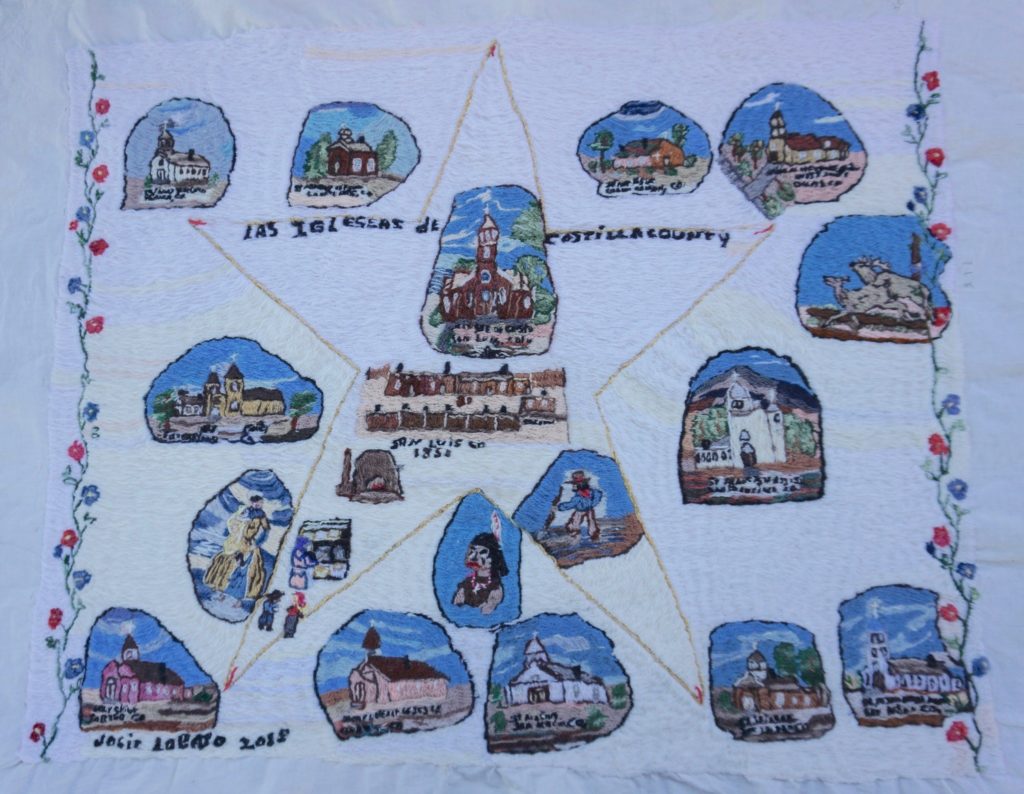
Josephine Lobato is a natural storyteller. But instead of words, she uses self-dyed yarn and a traditional Spanish stitch to tell the story of her life and the history of her town.
“All my colchas are real. They’re not made-up stories. They’re what was happening around me,” she said.
Colcha is a Spanish colonial style of needlework. It’s like embroidery, but less delicate. More rough, rustic and wild. The mother of eight used the history of her hometown in southern Colorado, San Luis, its people and her imagination to create a visual biography.
“I wanted my children to know about the life I had there. And I sort of thought it could be a legacy for my kids,” she said.
That visual legacy has earned her a National Heritage Fellowship from the National Endowment for the Arts. What makes Lobato unique, said Cliff Murphy, director of folk and traditional arts at the NEA, is how she uses colchas to commemorate historical events.
“Josie’s is really a vehicle for how people within the community remember themselves and remember significant events that have helped to shape who they are,” he said.

Lobato was celebrating her 83rd birthday with her family when she got the call from Democratic Sen. Michael Bennet to tell her she was selected for the fellowship. She thought it was a joke at first.
“I was shocked,” she said. Because she had been nominated in 2017.
Lobato started making colchas in her 50s, after going to an embroidery class. She didn’t like embroidery. But was encouraged to try and make a colcha. So she did one of Fort Garland. The stitch may be easy, but the piece was difficult. She had to learn things like what direction dirt goes. But after finishing, she was hooked.
For her, it’s not just about preserving her history, it’s also about bringing back some of the state’s lost heritage.
“Colorado migration had lost the art. I saw it in New Mexico, but I didn’t see it in Colorado. And so I felt like it needed to be taught,” she said.
Lobato teaches at the University of Colorado and does workshops, too. She encourages her students to go beyond the New Mexico colcha style of flowers or religious iconography.
“I tell them you all have memories. You all have imagination. You all know what happened to you in your lifetime. Put it down, just design it.”
At the award ceremony at the Library of Congress Wednesday evening, NEA chair Mary Anne Carter used words like “skilled practitioner,” “a keeper of community memory,” and “steward” of tradition.
Lobato, award around her neck, dedicated the honor to her mother, a seamstress, who “always wanted me to learn to sew. But I didn’t want to.”
“All the creativity and skill and imagination, I’m sure I got from her,” she said. And she praised her hometown of San Luis, which provided the characters in her stories. After all, she said, there would be no colchas if not for them.
“I hope it makes my state of Colorado proud,” she said.
There will be a concert on Friday, Sept. 20, to honor all the National Heritage Fellows. It will be livestreamed at arts.gov and begins at 8 p.m. Eastern Standard Time.








